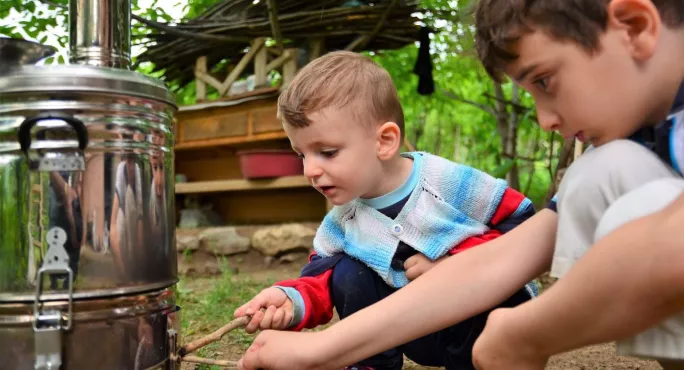- Home
- Why don’t we take pupils outdoors like we used to?
Why don’t we take pupils outdoors like we used to?

Traditionally, taking pupils away from their desks and the “serious business of learning” has been seen as a bit of jolly for the teacher - dismissed as staff wishing to top up their suntan in the playground as the pupils loll around in the muggy June air.
And while there has been a slow thawing of negative attitudes towards removing classes from their studies to be immersed in the great outdoors, this has generally only been when it can be tied to something tangible, such as a Duke of Edinburgh’s or John Muir award. In a profession driven by recording and accountability, the problem of going outside is that it isn’t recordable or accountable in the way a pass mark or scoreline is; anecdotal evidence of students sleeping better, feeling fitter and less anxious is simply not enough.
But a major new study could change all that. The report from the University of Exeter medical school found that simply being in nature for a minimum of two hours a week improves health and wellbeing. Using a comprehensive range of interviews with adults, it was found that a quarter of those who spent little or no time in nature reported poor health while almost half said they were not satisfied with their life.
A primary teacher’s view: ‘It’s time for schools to embrace outdoor learning’
Listen: Outdoor learning can be a breath of fresh air
Slow on the uptake: Why are we so reluctant to take learning into the outdoors?
Long read: Confronting risk with pupils in the Scottish mountains
Why are we all so risk-averse? Surely the idea of living a life in bubble-wrap is even scarier
On the other hand, barely 14 per cent of those who spent at least two hours in nature said their health was poor, and only a third did not feel satisfied. The benefits cut across age range, social groupings and even levels of previous health. And it is enough to simply be in nature: no resources for a dynamic outdoor activity nor mini-bus to go to remote places are necessary. A walk to a local park to do some reading, then, would be enough for the pupils to benefit from being in nature.
For school leaders, I think the most important element of the research is that it will make nature quantifiable and therefore easier to justify. As a species, humans tend to need a numerical peg to take their own health seriously, be it counting 10,000 steps each day, to sleeping the required eight hours. The two-hour nature jag could become as ubiquitous in the future as a five-a-day fruit a vegetable habit is today, making it far easier to persuade school decision makers to put being outdoors on the timetable. Climbing a tree or playing on a rope swing will not just be horsing around, but simply part of the two-hour outdoor session.
Of course, those who fear an already packed timetable becoming yet more busy would argue children could just put down their PlayStations and go out and play - the way we all used to do. The fact is, though, those days of playing in the street are long gone, either due to the perceived danger from strangers or the very real danger of traffic. But to witness the transformative power of taking pupils into nature would convince even the most anti-treehugger that this is something worth pursuing.
In my forest school sessions this season, a generally impatient pupil with ADHD has quietly pointed out a group of deer grazing in the woods while another has been monopolising the hammock, lying back to watch the clouds scud by. As a group we have observed the unique antics of a tiny tree creeper bird as it crawled up the bark to feed its young. None of these activities earns a certificate; nevertheless, being outdoors has its own unique value.
My own warmest memory of primary school is of sitting under the fruit trees in the school’s garden that bordered the playground in one of those rare sunny days in June as our teacher read a version of The Iliad to the class: whenever I hear of the wooden horse of Troy now, it takes me back to the east end of Glasgow.
Here’s hoping that this research, by quantifying the benefits of nature, will encourage teachers to overcome the disapproving looks of the senior management and the health and safety minefield of allergies, sunburns and fears over wasps. Let’s get our pupils outside the way our teachers did when we were young.
Gordon Cairns is a forest school and English teacher who works in Scotland
Keep reading for just £1 per month
You've reached your limit of free articles this month. Subscribe for £1 per month for three months and get:
- Unlimited access to all Tes magazine content
- Exclusive subscriber-only stories
- Award-winning email newsletters



